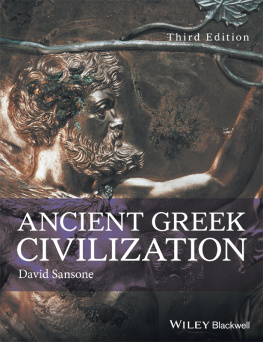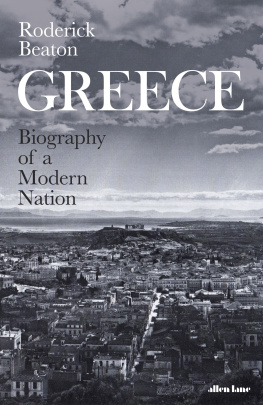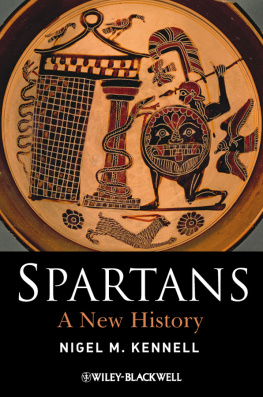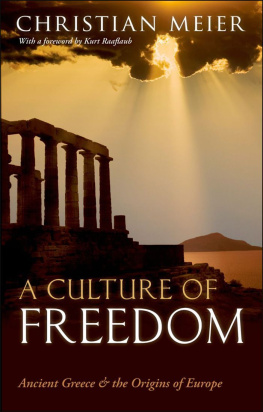A History of Greece
PALGRAVE ESSENTIAL HISTORIES
General Editor: Jeremy Black
This series of compact, readable and informative national histories is designed to appeal to anyone wishing to gain a broad understanding of a countrys history.
Published
A History of the Low CountriesPaul Arblaster
A History of ItalyClaudia Baldoli
A History of RussiaRoger Bartlett
A History of Spain (2nd edn)Simon Barton
A History of the British Isles (2nd edn)Jeremy Black
A History of IsraelAhron Bregman
A History of IrelandMike Cronin
A History of GreeceNicholas Doumanis
A History of the Pacific IslandsSteven Roger Fischer
A History of the United States (3rd edn)Philip Jenkins
A History of DenmarkKnud J. V. Jespersen
A History of PolandAnita J. Prazmowska
A History of IndiaPeter Robb
A History of China (2nd edn)J. A. G. Roberts
A History of GermanyPeter Wende
Series Standing Order
ISBN 1403938113 hardback
ISBN 1403938121 paperback
If you would like to receive future titles in this series as they are published, you can make use of the standing order facility. To place a standing order please contact your bookseller or, in case of difficulty, write to us at the address below with your name and address, the name of the series and one of the ISBNs above. Please state with which title you wish to begin your standing order. (If you live outside the United Kingdom we may not have the rights for your area, in which case we will forward your order to the publisher concerned.)
Customer Services Department, Macmillan Distribution Ltd Houndmills, Basingstoke, Hampshire RG21 6XS, England
A History of Greece
Nicholas Doumanis


Nicholas Doumanis 2010
All rights reserved. No reproduction, copy or transmission of this publication may be made without written permission.
No portion of this publication may be reproduced, copied or transmitted save with written permission or in accordance with the provisions of the Copyright, Designs and Patents Act 1988, or under the terms of any licence permitting limited copying issued by the Copyright Licensing Agency, Saffron House, 610 Kirby Street, London EC1N 8TS.
Any person who does any unauthorized act in relation to this publication may be liable to criminal prosecution and civil claims for damages.
The author has asserted his right to be identified as the author of this work in accordance with the Copyright, Designs and Patents Act 1988.
First published 2010 by
PALGRAVE MACMILLAN
Palgrave Macmillan in the UK is an imprint of Macmillan Publishers Limited, registered in England, company number 785998, of Houndmills, Basingstoke, Hampshire RG21 6XS.
Palgrave Macmillan in the US is a division of St Martins Press LLC, 175 Fifth Avenue, New York, NY 10010.
Palgrave Macmillan is the global academic imprint of the above companies and has companies and representatives throughout the world.
Palgrave and Macmillan are registered trademarks in the United States, the United Kingdom, Europe and other countries.
ISBN 978-1-4039-8613-9 hardback
ISBN 978-1-4039-8614-6 paperback
This book is printed on paper suitable for recycling and made from fully managed and sustained forest sources. Logging, pulping and manufacturing processes are expected to conform to the environmental regulations of the country of origin.
A catalogue record for this book is available from the British Library.
A catalog record for this book is available from the Library of Congress.
10 9 8 7 6 5 4 3 2 1
19 18 17 16 15 14 13 12 11 10
Printed and bound in China
Contents
List of Maps and Illustrations
MAPS
ILLUSTRATIONS
Preface
A History of Greece traces the story of Greek communities since the Bronze Age (c.33001200 BC), from the time when the Greek language was first spoken in the Aegean area. The book has been written for those who have often wondered what it is that Homer, Alexander the Great, the Byzantine emperors, and Zorba and Aristotle Onassis might have in common. What made each of them Greek? Why has Greek culture survived in one of the worlds most historically contested regions? Why is Greek among the worlds oldest living languages?
For too long, these questions have been approached in the wrong way. Modern commentators have often worked with a fixed notion of Hellenism: that Greek culture is a specific entity that was set in stone during the Classical Era. Since the eighteenth century, modern Greeks have tried to force that Classical connection by having a contrived version of Classical Greek () as the national language, and by replacing current placenames with their original classical versions. Westerners, on the other hand, have often complained there is no resemblance between ancient and modern Greeks, and have therefore concluded there is no connection.
Astonishingly, the question of Greek continuity has seldom been approached with the understanding that cultures and ethnic groups evolve, often into something quite unrecognizable. This book follows the history of the Greeks as it unfolds, although an important feature of that process of unfolding has been the tendency to reconstitute Greekness in accordance with the Classical paradigm: in Roman, Byzantine and modern times, identities were refashioned through conscious imitation of the classical Greek tradition. The book also works on the assumption that no culture can develop within a vacuum. Greek culture was shaped and re-shaped through its relations with other cultures. Classical Greece was a unique little world, but it had been indelibly influenced by Egypt and the more established societies of the eastern Mediterranean. The transnational context is vital to our understanding of every stage in this long history. Greece might not exist today but for the West and its rise of global dominance, and for the fact that Westerners had a special interest in the Greek heritage.
A History of Greece is not about a nation, although the Greek nation is very much part of its bifurcating story. It wastes no time with such matters as bloodlines, even if such ideas have common currency among many Greeks today. Rather, A History of Greece will follow the fortunes of a cultural group that made sense of itself as an ethnic unit, or as a much broader cultural system or , Rhomoi), in the sense that they identified with the Hellenized part of the Roman Empire and its legacy.
The book is primarily written for the general reader. The need for brevity has meant that many important topics have been sacrificed, hence there is very little on the Greek Orthodox Church and modern intellectual trends, and no discussion of the Christological debates of Late Antiquity, or Cavafy and Kazantzakis. A great deal of recent scholarship has been synthesized for this undertaking, but as far as possible I have tried to provide a seamless narrative.
* * *
I must begin by thanking Chrissie Verevis, who read the entire manuscript and provided a great deal of useful commentary. Another Cazzie, Nick Pappas, also read it and offered encouraging commentary, as did Milan Voykovic. In the course of writing this book I shamelessly exploited friends who work on aspects of Greek History. For the ancient eras, Ben Brown, Geoff Nathan and Shawn Ross suffered relentless questioning. Over a much longer period, I learned much from discussions with the following modern historians, anthropologists and polymaths: Petro Alexiou, Philip Carabott, David Close, Richard Clogg, Vicky Doulaveras, Effi Gazi, George Hatzikosmidis, Antonis Liakos, Margaret Poulos, Neni Panourgia, David Sutton, Yanis Varoukafis and Alfred Vincent. Id also like to thank the many scholars whose works have given me an education in Greek history, but who I have not had the privilege to meet. They are listed in the bibliography. Crucial to the completion of this book have been the following providers of the
Next page










